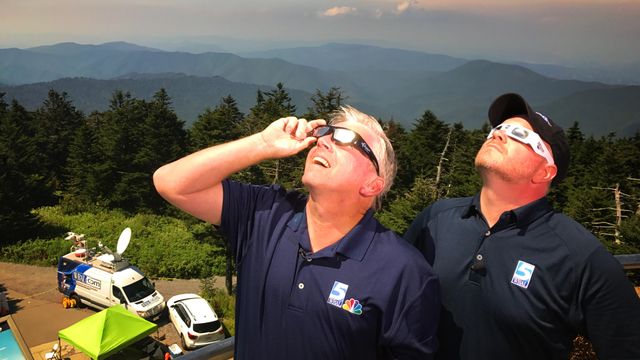'Science illuminates God's work:' Greg Fishel recounts 2017 Eclipse
WRAL Chief Meteorologist Greg Fishel was emotional while experiencing his first total solar eclipse.
Posted — UpdatedIt all started Sunday morning around 8am when Nate Johnson picked me up at my house, and we began the venture to Clingmans Dome in the Great Smoky Mountains National Park. After a stop in Asheville for lunch, we continued on, reaching our hotel in Cherokee, NC mid afternoon. After checking in, we headed for the 3rd highest peak east of the Mississippi River. It's only 11 miles from Cherokee as the crow flies, but these mountain roads don't behave like crows! It's about a 25 mile trek up to the parking lot. Then, it's another half a mile walk up to the summit, and this is where I really struggled the first time up. The average angle of elevation is 7.55º which works out to a grade of over 13%! I had to stop several times to catch my breath. The next day, I took baby steps, and never had to stop once. The observation deck is a cement structure that winds around in a helical manner to an elevation of a little over 50 feet above the ground. We did our broadcasts from the top of that tower Sunday night as well as all day Monday.
Now, on to the specifics of the eclipse. Clingmans Dome was slightly off the center of the path of Totality so instead of having 2.5 minutes of darkness, we had to settle for 1 minute and 24 seconds. But the view from such a high elevation more than made up for that. Monday morning there was already a considerable amount of cloudiness. As the day progressed, more and more of the sky was obscured by clouds, and by 1pm, I was beginning to lose hope. But then the sun reappeared, and it is likely that a few degrees of cooling ahead of Totality actually began to erode the cumulus clouds, which of course are driven largely by heating. I continued to look at the sun with my eclipse glasses on, and the moon kept eating away at the sun, to the point when around 2:30pm, well over 90% of the sun was covered. But things were not really all that dark yet. Then, shortly after 2:35pm the last sliver of sunlight disappeared behind the moon, and the outer edges of the sun (corona and chromosphere) suddenly burst onto the scene. To me it looked like an explosion of light on the outer edges of the sun. It was nothing short of remarkable. But what I didn't anticipate at all was what looked like a sunset that stretched all the away around the horizon! It turns out that this light was emanating from areas less than 40 miles away that weren't experiencing totality. So what light we were getting was coming in from the sides, not from above.
During totality, David Crabtree asked me what this was like for me, both as a scientist, and as a human being. At that moment, I was overcome with emotion that up until that very second was nowhere to be found. A phrase popped into my mind that I have used many many times. I truly believe that science is the discovery of God's creation, and it makes me sad to realize that so many see religious faith and science as mutually exclusive entities. Do not misconstrue. Your right to NOT believe in God is just as valid as my right TO believe in God. And it is certainly not right for me to pass judgement on anyone one way or the other. I am simply sharing with you my thoughts and beliefs, and just because I'm on television, my beliefs aren't any more valuable than yours.
Moving on, after 1 minute and 24 seconds, the sun started to "burst" back on to the scene. At this point, everybody started to head home. I'm kidding here, but I almost felt sorry for the moon. Why? The party was only half over, but few seemed to care about the second half. One final scientific note - When things lightened back up, we looked up and realized just about all the clouds had disappeared. The cooling associated with the eclipse which I mentioned earlier, had eliminated one of the mechanisms that generates clouds over high terrain, and that mechanism is heating! The heating was replaced by cooling, and the clouds went bye-bye.
If science is indeed a gift from God, we can trust it. On March 7, 1970, an astronomer told Charles Kuralt of CBS news during a national broadcast that the next eclipse to cross the country from coast to coast would occur in the year 2017. Forty seven years later, it happened right on schedule. The Universe is not an exercise in chaos. Science has taught us that there is order and predictability present. And the more we learn, the more that idea becomes apparent. How privileged we are to have been given a brain that enables us to acquire more and more knowledge about our world, and the vastness that surrounds it. No matter how you think this all came to be, it's pretty darn awesome!
Related Topics
• Credits
Copyright 2024 by Capitol Broadcasting Company. All rights reserved. This material may not be published, broadcast, rewritten or redistributed.






